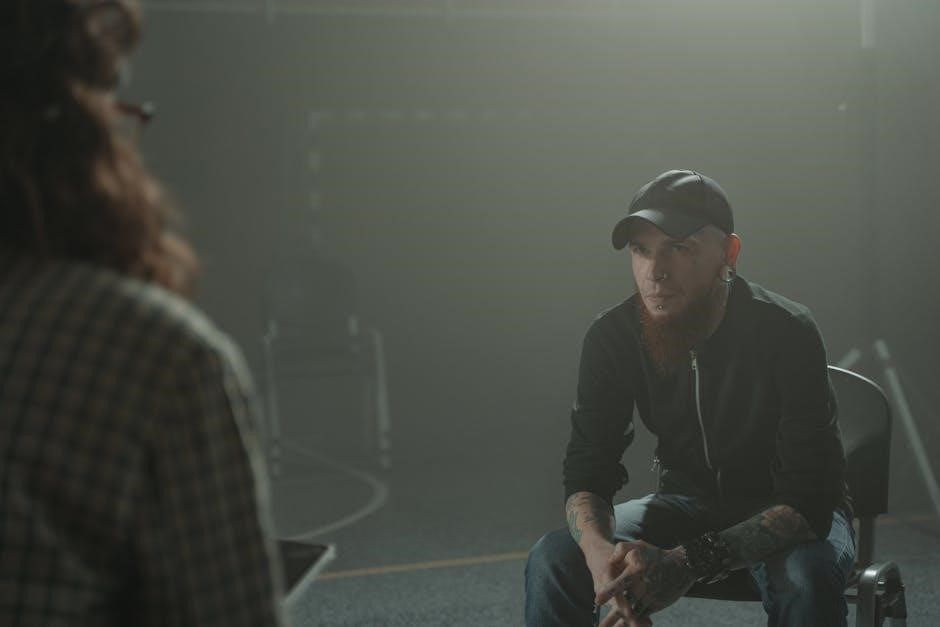
Instructional coaching is a professional development strategy focusing on improving teaching practices and student learning. Coaches collaborate with teachers to implement evidence-based methods, fostering educational growth and excellence.
What is an Instructional Coach?
An instructional coach is an educational leader who works with teachers to improve teaching practices and student learning. They partner with educators to implement research-based strategies, providing professional development and support. Coaches focus on building teacher capacity, fostering collaboration, and enhancing instructional effectiveness. Their role is non-evaluative, emphasizing growth and improvement. By sharing best practices and offering feedback, instructional coaches help create dynamic learning environments where both teachers and students thrive. Their ultimate goal is to strengthen teaching skills and promote academic success, making them invaluable assets to schools and districts committed to educational excellence.
The Role and Responsibilities of an Instructional Coach
Instructional coaches play a pivotal role in enhancing teacher effectiveness and student outcomes. Their primary responsibilities include providing professional development, modeling best practices, and offering constructive feedback. Coaches collaborate with teachers to design and implement research-based strategies, often through one-on-one coaching or group workshops. They also assess instructional needs, develop personalized growth plans, and monitor progress. Additionally, instructional coaches foster a culture of collaboration by facilitating peer observations and professional learning communities. Their work is centered on empowering educators with the tools and confidence to improve classroom practices, ultimately benefiting student learning and academic achievement.

Common Instructional Coach Interview Questions

Interviews often include questions about coaching strategies, classroom observations, and improving teacher practices, focusing on scenarios, behavioral traits, and technical knowledge relevant to instructional coaching.

Behavioral Questions
Behavioral questions in instructional coach interviews assess how candidates handle real-life teaching scenarios. Examples include, “Describe a time you helped a struggling teacher improve their practice,” or “How do you foster collaboration among staff?” These questions evaluate problem-solving, communication, and leadership skills. They often focus on specific experiences, such as resolving conflicts or implementing new strategies. Candidates are encouraged to provide detailed, anecdotal responses that demonstrate their ability to coach effectively. The goal is to reveal how they apply instructional coaching principles in practical situations, showcasing their interpersonal and professional competencies. These questions help employers gauge a candidate’s readiness for the coaching role and its challenges.
Scenario-Based Questions
Scenario-based questions in instructional coach interviews present hypothetical situations to assess problem-solving and decision-making skills. Examples include, “How would you support a teacher resistant to new methods?” or “Describe how you’d handle a classroom management issue.” These questions require candidates to think critically and demonstrate their coaching approach. They often focus on common challenges, such as improving student engagement or addressing diverse learning needs. Employers use these scenarios to evaluate how well candidates apply instructional strategies and maintain a student-centered focus. Candidates should provide clear, actionable responses that highlight their ability to adapt and lead effectively in various educational contexts.
Technical Questions
Technical questions in an instructional coach interview assess a candidate’s knowledge of educational strategies and tools. They may ask about data-driven instruction, differentiated teaching methods, or technology integration. Questions like, “How do you assess teacher needs?” or “What tools do you use for progress monitoring?” are common. These inquiries gauge a candidate’s understanding of best practices and their ability to implement them effectively. Employers seek evidence of expertise in areas such as curriculum design, formative assessments, and professional development. Candidates should provide specific examples and methodologies, demonstrating their technical proficiency and ability to enhance teaching and learning outcomes in the classroom.

Preparing for the Interview
Research the school district, review your teaching philosophy, and practice responses to common questions. Showcase your coaching experience and knowledge of best educational practices effectively.
Researching the School and District
Researching the school and district is crucial for a successful instructional coach interview. Understanding their mission, values, and goals helps align your responses with their priorities. Investigate the district’s demographics, challenges, and recent achievements to demonstrate your awareness and enthusiasm. Review their websites, strategic plans, and recent news articles to gain insights into their educational focus. Familiarize yourself with their curriculum and initiatives to show how your coaching skills can support their objectives. This preparation not only highlights your professionalism but also allows you to ask informed questions during the interview, showcasing your genuine interest in contributing to their educational community.
Reviewing Your Teaching Philosophy
Reviewing your teaching philosophy is essential for an instructional coach interview. It helps you articulate your beliefs about education, teaching, and learning, ensuring alignment with the school’s mission. Reflect on your core values, such as student-centered learning, collaboration, and evidence-based practices. Consider how your philosophy translates into actionable strategies for supporting teachers and students. Be prepared to discuss how your beliefs guide your coaching approach and how you adapt to diverse educational settings. This preparation enables you to confidently address questions about your coaching style and demonstrate your commitment to improving instruction and student outcomes, showcasing your readiness to contribute meaningfully to the school community.
Practicing Common Responses
Practicing common responses is crucial for acing an instructional coach interview. Anticipate questions about your coaching philosophy, classroom strategies, and problem-solving abilities. Use the STAR method to structure your answers, detailing situations, tasks, actions, and results. Review scenarios related to teacher support, lesson planning, and student improvement; Practice discussing challenges, such as resistance to change or difficult conversations, showcasing your problem-solving skills. Rehearse responses to technical questions about instructional strategies and data analysis. Record your answers to identify areas for improvement. The more prepared you are, the more confident and articulate you’ll appear, demonstrating your readiness to effectively coach and support educators, ultimately benefiting student learning and school success.

Tips for Acing the Instructional Coach Interview
Highlight your coaching experience, demonstrate knowledge of best practices, and show enthusiasm for education. Prepare thoughtful questions to ask the interviewer, emphasizing your commitment to teacher growth and student success.
Highlighting Your Coaching Experience
To excel in an instructional coach interview, emphasize your coaching experience by sharing specific examples of successful teacher collaborations. Highlight instances where you helped implement research-based strategies, leading to improved student outcomes. Discuss your ability to build trust and foster professional growth among educators. Showcase your expertise in observing classrooms, providing constructive feedback, and facilitating professional development. Quantify achievements, such as increased teacher confidence or student performance gains, to demonstrate your impact. Be prepared to articulate how your coaching philosophy aligns with the school’s goals. Use concrete stories to illustrate your problem-solving skills and commitment to educational excellence. This will help establish your credibility as an effective coach;
Demonstrating Knowledge of Best Practices
Demonstrating Knowledge of Best Practices
Demonstrating knowledge of best practices is crucial during an instructional coach interview. Highlight your familiarity with evidence-based teaching strategies, such as differentiated instruction and formative assessments. Discuss how you stay updated on educational research and innovative methodologies. Share examples of how you’ve successfully integrated these practices into coaching sessions, leading to measurable improvements in teacher effectiveness and student learning. Emphasize your understanding of coaching models, such as the partnership approach, and how they align with fostering a growth-oriented school culture. Be prepared to connect theoretical knowledge with practical applications, showcasing your ability to adapt best practices to meet the unique needs of teachers and students.
Showing Enthusiasm and Passion for Education
Showing genuine enthusiasm and passion for education is vital during an instructional coach interview. Highlight your love for teaching and learning, and how it drives your commitment to supporting educators and students. Share personal stories or experiences that showcase your dedication to improving educational outcomes. Discuss how your passion for education motivates you to collaborate with teachers, fostering a positive and growth-oriented school culture. Express excitement about the opportunity to contribute to the district’s mission and goals. Authenticity is key—interviewers want to see that you are deeply committed to making a meaningful impact in education. Passion can set you apart as a candidate.

Salary and Benefits Discussion
Understanding the compensation package and negotiating salary and benefits are crucial steps in the hiring process for instructional coaches. Research district pay scales and benefits thoroughly.

Understanding the Compensation Package
Understanding the compensation package is essential for instructional coaches. It typically includes salary, health insurance, retirement plans, and additional benefits like professional development opportunities. Research the district’s pay scale to anticipate expectations. Consider factors such as experience level, education, and location, which influence salary ranges. Some districts may offer bonuses or stipends for specialized roles. Benefits may also include paid leave, wellness programs, and tuition reimbursement. Clarify whether the package aligns with your career goals and financial needs. This understanding ensures you are prepared for negotiations and can make an informed decision if offered the position.
Negotiating Salary and Benefits
Negotiating salary and benefits requires preparation and confidence. Research the market rate for instructional coaches in your area to set realistic expectations. Highlight your qualifications, experience, and unique skills to justify your requested compensation. Be professional and polite during discussions, ensuring alignment with the school’s budget and policies. Consider non-monetary benefits, such as professional development opportunities or flexible schedules, if salary adjustments are limited. Have a clear idea of your minimum acceptable offer and be ready to advocate for yourself. Remember, negotiation is a conversation, not a confrontation, and aim for a mutually beneficial agreement that reflects your value to the school.

Final Thoughts
Preparing thoroughly and demonstrating passion for education will help you excel in your instructional coach interview, making a lasting impact on both teachers and students.
Follow-Up After the Interview
A well-crafted thank-you note or email sent within 24 hours of the interview is essential. Express gratitude for the opportunity, reaffirm your interest in the role, and highlight key points discussed. Personalize the message by mentioning specific topics or insights shared during the conversation. This demonstrates professionalism and enthusiasm. Additionally, politely inquire about the expected timeline for the hiring decision. Following up shows dedication and helps keep you top of mind for the interview panel. Ensure your communication is concise, polite, and reflective of your passion for educational leadership. This step can significantly impact the final impression you leave on potential employers.
Next Steps in the Hiring Process
After the interview, the hiring team typically reviews candidate performances and may conduct reference checks. If selected, you’ll receive a formal job offer outlining salary, benefits, and start date. Upon acceptance, prepare for onboarding, which includes orientation and familiarization with school policies. If unsuccessful, ask for feedback to improve future applications. Understanding these steps helps candidates navigate the process smoothly and professionally. Staying proactive and informed demonstrates commitment to the role and the school community. Effective communication and patience are key during this phase of the hiring process for an instructional coaching position.